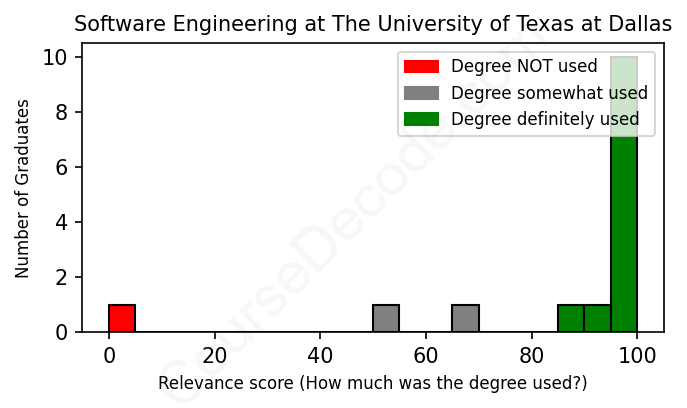
First, some facts. Of the Software Engineering graduates from The University of Texas at Dallas we've analyzed , here's how many have used (or NOT used) their degree in their career:

These are estimates based on AI analysis of 15 LinkedIn profiles (see below).
The verdict? Significantly above average. Overall, with an average relevance score of 86%, Software Engineering graduates from The University of Texas at Dallas have a much higher likelihood (+19%) of finding work in this field compared to the average graduate across all fields:
And for comparison, here's the chart for all profiles we've looked at across all degrees.
Also, after graduating, only 26% of these graduates have pursued further education other than another Bachelor's degree (such as a Masters degree or other), compared to the average across all profiles of 35%. This suggests a Bachelors degree is enough for most Software Engineering graduates, and it's normal to look for work straight after graduation.
See the details:
|
Relevance score: 100% We think this person has gone into a career highly relevant to their degree. We think this person has gone into a career highly relevant to their degree.
DEGREE INFOGraduated in 2022 from The University of Texas at Dallas with a Bachelor of Engineering - BE in Software Engineering. No other secondary education since. JOB HISTORY SINCE GRADUATIONSoftware Engineer Deloitte Jun 2022 - Present ABOUTHello! I am an alumni at University of Texas at Dallas. One of my passions is programming. Programming and problem solving is something that I could spend hours on doing. I enjoy being able to learn more everyday in just about everything and apply my knowledge to best help the people around me. On my free time, I would always think of problems and attempt to solve them using my available skill sets and further improve my knowledge on any subject! |
The top 10 most common jobs done by the graduates we've analyzed (ranked most common to least) are:
When looking at the jobs held by graduates with a degree in Software Engineering from The University of Texas at Dallas, it’s clear that many have jumped into roles that are closely tied to their studies. The most common positions include Software Engineer, Web Developer, and roles like Engineering Lead or Technical Lead. These jobs are not only numerous, but they're also directly relevant to the skills and knowledge gained during their degree. Places like Google, Microsoft, and IBM stand out as companies that value the educational background these graduates bring, as their roles emphasize coding, system design, and software development—key components of a Software Engineering degree.
However, not everyone has landed a job that fits neatly into the software engineering box. Some have ventured into roles like Quality Engineer, which, while needing analytical skills, don’t strictly require the core software engineering knowledge. There are even students who took on roles like Graphic Design Intern and Epitaxy Research Technician that stray far from what you’d expect for a software engineering graduate. Overall, it seems like most graduates are well-positioned in jobs that leverage their technical skills, though a few have wandered into less relevant territories. The majority definitely find themselves in roles that reflect the core principles of what they studied, making their career paths pretty solid and aligned with their degrees.
Here is a visual representation of the most common words in job titles for Software Engineering graduates (this is across all Software Engineering graduates we've analyzed, not just those who went to The University of Texas at Dallas):

Looking at the career trajectories of graduates from The University of Texas at Dallas who studied Software Engineering, it’s pretty clear that many of them have landed solid jobs in tech right after graduation. Most grads seem to kick off their careers with internships or entry-level positions in software development, like software engineers or web developers. For instance, those who graduated in 2015 jumped into roles at prominent companies like Google and firms within the defense sector. Fast forward just a few years, and many of them were promoted to senior or lead positions, which indicates a strong upward mobility within their careers.
As we trace their paths five to ten years post-graduation, the trends continue to show a positive trajectory. Graduates have moved into higher-level roles, often becoming technical leads or even managers at notable companies like Microsoft, Raytheon, and Deloitte. However, not everyone followed the traditional route; some ventured into self-employment or alternative paths within tech, such as game development or working with AI. While there are a few cases of graduates branching out away from pure software engineering roles, the overall picture reflects a thriving job market for Software Engineering majors from UT Dallas, making it look like a solid choice for students interested in pursuing a tech career.
Honestly, a Bachelor's degree in Software Engineering, including at places like The University of Texas at Dallas, can be pretty challenging, but it's also super rewarding if you’re into tech. You’ll dive deep into programming languages, algorithms, and all sorts of software development stuff, which can get intense, especially when you hit those coding projects and group assignments. Most students find that it requires a solid commitment and good problem-solving skills, but if you’re passionate about the subject, you’ll find plenty of support and resources along the way. It’s not impossible by any means, but it definitely keeps you on your toes!
Most commonly, in the LinkedIn profiles we've looked at, it takes people 4 years to finish a Bachelor degree in Software Engineering.
From what I can see, it looks like these graduates from The University of Texas at Dallas are generally doing pretty well in their careers and likely making decent money. Many of them have landed roles at well-known tech companies like Google, Microsoft, and IBM, which usually pay quite well. Plus, those who graduated more recently, like the ones from 2022 and 2023, are securing jobs quickly, even in competitive fields like software engineering and AI training. The trend seems to point to a solid upward trajectory, so on the whole, I'd say these folks are in a good spot financially!
Here is a visual representation of the most common words seen in the "about" section of LinkedIn profiles who have a Bachelor degree in Software Engineering (this is across all Software Engineering graduates we've analyzed, not just those who went to The University of Texas at Dallas). This may or may not be useful:

Here are all colleges offering a Bachelor degree in Software Engineering (ordered by the average relevance score of their Software Engineering graduates, best to worst) where we have analyzed at least 10 of their graduates:
| College | Score | Count |
|---|---|---|
 San Jose State University San Jose State University
|
88 | 12 |
 Iowa State University Iowa State University
|
87 | 10 |
 The University of Texas at Dallas The University of Texas at Dallas
|
86 | 15 |
 Brigham Young University - Idaho Brigham Young University - Idaho
|
85 | 19 |
 Arizona State University Arizona State University
|
83 | 13 |
 Florida Gulf Coast University Florida Gulf Coast University
|
72 | 17 |
 University of Phoenix University of Phoenix
|
64 | 17 |
 Kennesaw State University Kennesaw State University
|
62 | 10 |
 Western Governors University Western Governors University
|
60 | 10 |